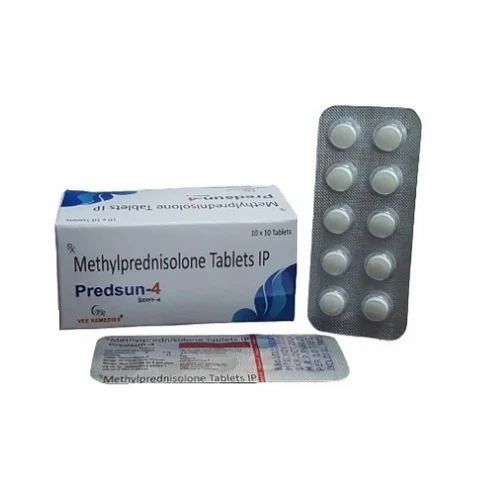Methylprednisolone: Benefits & Risks
What are the benefits of Methylprednisolone?
Methylprednisolone is a corticosteroid medication that is used to reduce inflammation and suppress the immune system. It is used to treat a variety of conditions, including allergic disorders, skin conditions, arthritis, lupus, asthma, and certain types of cancers such as acute lymphoblastic leukemia, acute myeloid leukemia, breast cancer, brain tumors, and prostate cancer. Some of the benefits of methylprednisolone include:
- Anti-inflammatory effects: Methylprednisolone helps reduce inflammation in the body, which can help relieve symptoms such as pain, swelling, and redness.
- Immunosuppressive effects: Methylprednisolone suppresses the immune system, which can be beneficial in treating autoimmune conditions such as lupus and rheumatoid arthritis, where the immune system is overactive and attacks healthy tissues.
- Allergic reactions: Methylprednisolone can be used to treat severe allergic reactions, such as anaphylaxis, and to prevent allergic reactions to certain medications or substances.
- Respiratory conditions: Methylprednisolone can be used to treat respiratory conditions such as asthma and chronic obstructive pulmonary disease (COPD) by reducing inflammation in the airways and improving breathing.
- Skin conditions: Methylprednisolone can be used to treat skin conditions such as eczema, psoriasis, and allergic reactions that affect the skin.
- Joint and muscle conditions: Methylprednisolone can be used to treat joint and muscle conditions such as arthritis, bursitis, and tendonitis, by reducing inflammation and pain.
- Cancer treatment: Methylprednisolone is sometimes used as part of cancer treatment to reduce inflammation and suppress the immune system, especially in cases of lymphoma and leukemia.
It’s important to note that while methylprednisolone can be effective in treating a variety of conditions, it can also cause side effects and may not be suitable for everyone. It’s essential to use methylprednisolone only as prescribed by a healthcare provider and to follow their instructions carefully.
What are the risks of Methylprednisolone?
Methylprednisolone, like other corticosteroid medications, can cause a range of side effects and health risks, especially when used long-term or at high doses. It’s important to be aware of these risks and discuss them with your healthcare provider before starting treatment. Some of the risks associated with methylprednisolone include:
- Suppression of the immune system: Methylprednisolone suppresses the immune system, which can increase the risk of infections. It’s important to avoid exposure to infectious diseases while taking methylprednisolone, especially chickenpox and measles.
- Increased risk of osteoporosis: Long-term use of methylprednisolone can lead to thinning of the bones (osteoporosis), which can increase the risk of fractures.
- Gastrointestinal effects: Methylprednisolone can cause gastrointestinal side effects, such as stomach irritation, ulcers, and bleeding, especially when taken at high doses or for long periods.
- Weight gain: Methylprednisolone can cause weight gain, especially in the face (moon face), neck, and trunk.
- Fluid retention: Methylprednisolone can cause fluid retention, leading to swelling in the hands, feet, or ankles, and increased blood pressure.
- Mood changes: Methylprednisolone can cause mood changes, such as irritability, agitation, and depression, especially when taken at high doses or for long periods.
- Increased blood sugar levels: Methylprednisolone can increase blood sugar levels, which can be problematic for people with diabetes or preexisting glucose intolerance.
- Eye problems: Long-term use of methylprednisolone can increase the risk of cataracts and glaucoma.
- Skin problems: Methylprednisolone can cause skin problems, such as thinning of the skin, easy bruising, and slow wound healing.
- Adrenal suppression: Long-term use of methylprednisolone can suppress the adrenal glands, leading to adrenal insufficiency when the medication is stopped abruptly.
It’s important to use methylprednisolone only as prescribed by a healthcare provider and to follow their instructions carefully. Your healthcare provider can help determine if methylprednisolone is the right choice for you and can monitor you for any potential side effects or health risks.
TL;DR: Methylprednisolone Summary
Methylprednisolone is a prescription medication belonging to the class of drugs known as corticosteroids. It is commonly used to treat a variety of conditions, including inflammation, allergic reactions, autoimmune diseases, and certain types of cancer. Methylprednisolone is a potent anti-inflammatory and immunosuppressant medication that works by reducing inflammation and suppressing the immune system.
Methylprednisolone is available in various forms, including tablets, injections, and intravenous solutions. The dosage and duration of treatment with Methylprednisolone will vary depending on the individual’s condition, medical history, and response to treatment.
Methylprednisolone is often prescribed for conditions such as severe allergic reactions, asthma, arthritis, lupus, multiple sclerosis, and certain skin conditions. It may also be used in the treatment of some cancers, organ transplants, and other conditions where inflammation or immune suppression is necessary.
Common side effects of Methylprednisolone may include increased appetite, weight gain, fluid retention, mood changes, insomnia, and gastrointestinal symptoms such as nausea or indigestion. More severe side effects may include high blood pressure, elevated blood sugar levels, osteoporosis, and an increased risk of infections. It is important to seek medical attention if you experience any severe or persistent side effects while taking Methylprednisolone.
Methylprednisolone can interact with other medications and supplements, so it is important to inform your healthcare provider about any existing medical conditions or medications you are taking before starting treatment with Methylprednisolone.
It is important to follow your healthcare provider’s instructions closely while taking Methylprednisolone and to attend regular follow-up appointments to monitor your response to treatment. Do not stop taking Methylprednisolone abruptly, as this can lead to withdrawal symptoms. Talk to your healthcare provider if you wish to discontinue Methylprednisolone or have any concerns about taking the medication.
If you have any questions or concerns about taking Methylprednisolone, be sure to discuss them with your healthcare provider. It is essential to seek medical advice if you have any concerns about your condition or experience any negative side effects while taking Methylprednisolone.




